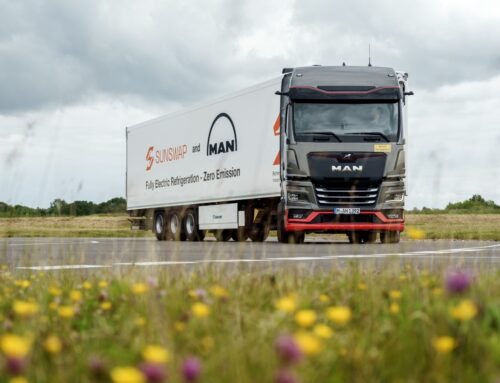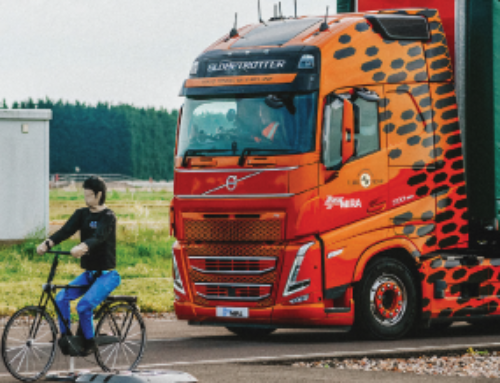Industry reacts to autumn statement announcements
 Transport trade groups have responded positively to a number of key fiscal policies affecting the sector that were outlined by the chancellor Jeremy Hunt in yesterday’s autumn statement, while calling for further detail and action in unaddressed areas.
Transport trade groups have responded positively to a number of key fiscal policies affecting the sector that were outlined by the chancellor Jeremy Hunt in yesterday’s autumn statement, while calling for further detail and action in unaddressed areas.
Measures unveiled by Mr Hunt included a freeze on vehicle excise duty (VED) for trucks and the HGV road user levy for a year from 1 April 2024, in line with the retail price index.
The Road Haulage Association (RHA) welcomed these developments, as well as a range of additional announcements, such as on business investment and planning reforms.
“We are delighted the chancellor has listened to RHA’s campaigning efforts on several fronts,” said the organisation.
“We are pleased to see VED for HGVs and the HGV levy frozen for 2024-25. This follows our recent campaigning and will support hauliers who are facing significant cost pressures.
“The cost of operating an HGV has risen by nearly 10 per cent over the past 12 months in the face of thin average margins of just two per cent.
“Our industry is experiencing reduced activity and fewer goods being moved due to cost-of-living challenges.
“Road freight volumes are down by 10 per cent and we have seen an increase in insolvencies with reduced profitability.”
RHA also welcomed the Treasury’s extension of the policy of temporary full expensing introduced in this year’s spring budget, to make the change permanent.
“Firms will be able to claim back the tax on buying new plant and machinery, including vans, lorries and warehousing equipment,” said the association.
“We are also pleased that that the chancellor acknowledged concerns that planning is often a barrier to investment in major infrastructure.
“The introduction of a premium planning service with guaranteed accelerated decision dates for major applications and new powers to hold councils to account is welcome. A strong network of safe, secure roadside truck parking facilities is a key priority for us.”
Yesterday’s statement from the chancellor also included the next set of investment zones, designed to drive up regional growth and investment. In addition to the announcement of new zones in Greater Manchester and the West and East Midlands, the government doubled the flexible funding envelope to £160 million by extending the scheme and associated tax reliefs from five to 10 years.
“The new investment zone deals are much needed and we urge that they’re supported with high-quality road infrastructure,” said RHA.
“We also support government action in creating more certainty for investors in low-carbon infrastructure. This is through extending the critical national priority designation for nationally significant low-carbon energy projects.”
Its recent calls for an emission-linked fuel rebate to encourage hauliers and coach operators to switch to low-carbon fuels such as HVO went unheeded for the time being, however; and the RHA said it would continue to call on the government to introduce such a policy.
The chancellor also announced a package of over £2 billion for the automotive sector to support the manufacture and development of zero emission vehicles, as well as their batteries and supply chain.
RHA said this was “welcome” but added: “We need to see more concrete plans on how this funding will be targeted towards commercial vehicles.”
Logistics UK said that autumn statement contained “encouraging signs” for businesses in its sector looking to drive economic recovery, but said more detail was required to demonstrate whether the industry would see real changes.
David Wells OBE, Logistics UK’s chief executive, said: “The decision to make the current full expensing allowance for capital permanent is a welcome step that will support logistics businesses with long-term planning and investment.
“Our members are keen to identify if this change will include the cost of acquiring leased or hired vehicles, as well as those purchased outright.
“In addition, detail is needed to identify whether the move will cover the cost of installing the infrastructure required to help the industry decarbonise, as our research shows this could amount to an outlay of up to £1 million per site – a prohibitive charge which will hinder the industry’s shift to net zero.”
Logistics UK also welcomed moves to streamline the planning system.
“Since our industry supplies every sector of the economy, it is vital that logistics is included as part of the overall planning process, not as a bolt-on afterthought,” continued Mr Wells.
“We will continue to press government to keep us at the heart of decision-making when it comes to business investment and development.”
He added: “The devil of today’s announcement will be in the detail. While there are indications that the statement could boost economic activity, our members are concerned about how Freeports and Investment Zones could work for them.
“In addition, businesses still need clarity on the support government will be providing for the transition to a net-zero economy, and we will be working closely with them in the coming weeks to ensure the best possible outcomes to keep the UK trading, both domestically and internationally.”
David Bushnell, director of consultancy and strategy at fleet management solutions provider Fleet Operations, said: “Chancellor Jeremy Hunt has begun flicking through the pages of the pre-election playbook to announce measures in his autumn statement, designed to help stimulate business growth.
“But for fleet operators his notable failure to cancel the planned increase in fuel duty next April will serve to dampen any early festive cheer.
“If this goes ahead, the first rise in over a decade would come at a time, in the wake of a cost of business squeeze, when fleets can least afford it.
“Making the full expensing capital allowance tax scheme, introduced in the last budget, permanent certainly comes as welcome news, helping to support many fleets’ bottom line, along with the transition to e-mobility.
“However, it is only cash-rich business with access to capital that benefit. Failing to extend the scheme to the leasing and rental sectors continues to prove a missed opportunity to support the wider fleet industry, and its critical role in driving business investment and transport decarbonisation.”
He continued: “Elsewhere, following the recent decision to delay the ban on the sale of petrol and diesel cars and vans, there had been high hopes that significant measures would be announced by the chancellor to help counteract the impact of this by incentivising EV adoption.
“But this was not forthcoming in any meaningful way, and once again, has proved a missed opportunity.”










